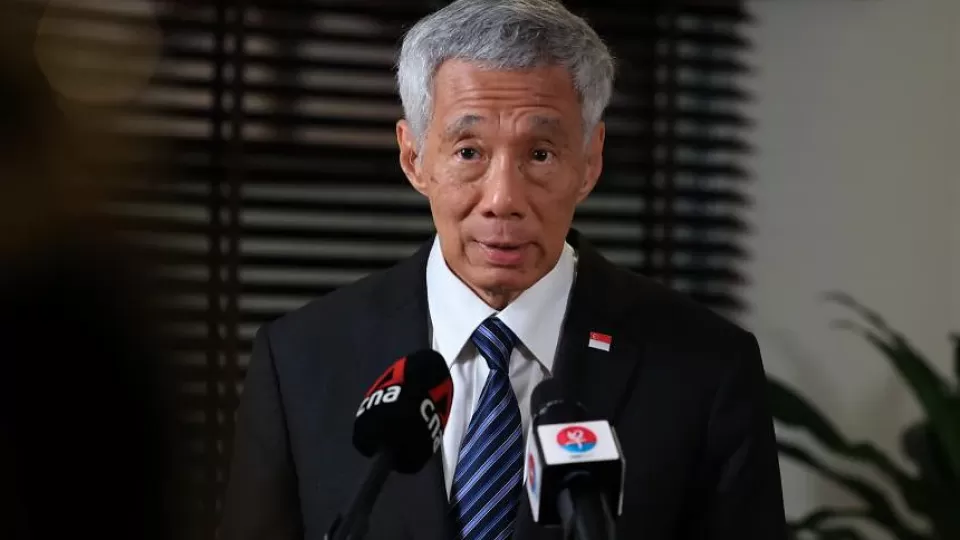November 17, 2022
SINGAPORE – Strong words against the Ukraine war expressed by Group of 20 (G-20) countries at a summit on Wednesday have let Russia know that the weight of international opinion is against it, said Prime Minister Lee Hsien Loong.
Not putting those statements into a communique would have meant a weakening of the pressure that needs to be applied on Russia, which has transgressed international norms and undermined the United Nations Charter, he said.
A declaration issued by the G-20 leaders on Wednesday said most members “strongly condemned the war in Ukraine”, but added that “there were other views and different assessments of the situation and sanctions”.
Earlier in the day, leaders of the world’s largest economies also spoke up against fresh missile strikes against Ukraine on Wednesday – the second day of the G-20 Leaders’ Summit – to deplore what had happened, call for peace and find a path forward, said PM Lee.
Speaking to Singapore reporters after the annual meeting, he said it was important that these views were expressed: that Russia knows this is the majority opinion of the international community, and that the view that Russia is in the wrong remains unchanged.
“If we had not said those statements, or if we had not been able to put those statements into the communique, I think it would have been a weakening of our moral case and a weakening of the pressure which is necessary to be brought to bear on a country which has transgressed against international norms and undermined the UN Charter.”
That G-20 leaders would arrive at a joint statement at the close of the summit was not a certainty. Indonesian President Joko Widodo told a news conference that the leaders were discussing the Bali declaration until midnight on Tuesday, with the most debated paragraph being the one on Russia’s war in Ukraine.
The two-day summit involving the leaders of the world’s largest economies had been overshadowed by the war in Ukraine, now in its eighth month, with fresh missile strikes on the capital of Kyiv and other cities on Tuesday.
A separate explosion in Poland on Tuesday at a grain facility near the Ukrainian border that killed two people had prompted an emergency meeting by Group of Seven and Nato leaders in Bali.
On the closely watched meeting between United States President Joe Biden and Chinese President Xi Jinping on Monday, PM Lee said that the meeting had a positive outcome.
The two leaders met in person on Monday for the first time since Mr Biden took office in 2021, amid strained US-China ties that worsened in recent months over issues such as curbs on the export of American chip technology to China.
PM Lee said the meeting showed the intention of both sides to stabilise relations and to avoid a conflict, as well as to work together to resolve the very difficult problems between them.
Both sides are renewing cooperation on issues such as climate change, and have pledged to follow up with high-level contacts and discussions, with US Secretary of State Antony Blinken going to China in the first quarter of 2023.
“So, they are starting to deal with the problems, but of course the problems themselves are very difficult ones and it will take some time to resolve, and I think it will be tough,” said PM Lee. “I think it is a positive outcome, but it is far from the end of the issue.”
Geopolitical tensions have shown that developments abroad can affect Singapore, said PM Lee, who called for Singaporeans to be psychologically prepared and to stay united. The Ukraine war has already raised the cost of energy and food for the Republic, while countries have become preoccupied with security issues, he noted.
“If there is a conflict in our part of the world, or problems between US and China, that will most definitely affect us,” he said. “And it could be instability in the region, it could be considerable economic impacts on investment (and) trade flows.”
On the sidelines of the summit on Wednesday, PM Lee met his counterparts from France, India and South Africa.
In their meeting, French President Emmanuel Macron and PM Lee discussed the warm, longstanding and multifaceted ties between their two countries, and exchanged views on global and regional situations.

Prime Minister Lee Hsien Loong meeting French President Emmanuel Macron on the sidelines of the G-20 summit. PHOTO: AFP
PM Lee and Indian Prime Minister Narendra Modi reaffirmed strong bilateral relations and discussed ways to expand cooperation in new areas such as digitalisation and energy security, said PM Lee’s press secretary Chang Li Lin. PM Lee also thanked Mr Modi for inviting Singapore to participate in the G-20 meetings in 2023, which India will host next September.
PM Lee and South African President Cyril Ramaphosa discussed regional and global developments on Wednesday. PM Lee noted that South Africa is one of Singapore’s largest trading partners in sub-Saharan Africa, and that the bilateral relationship had continued to grow even during the Covid-19 pandemic.

